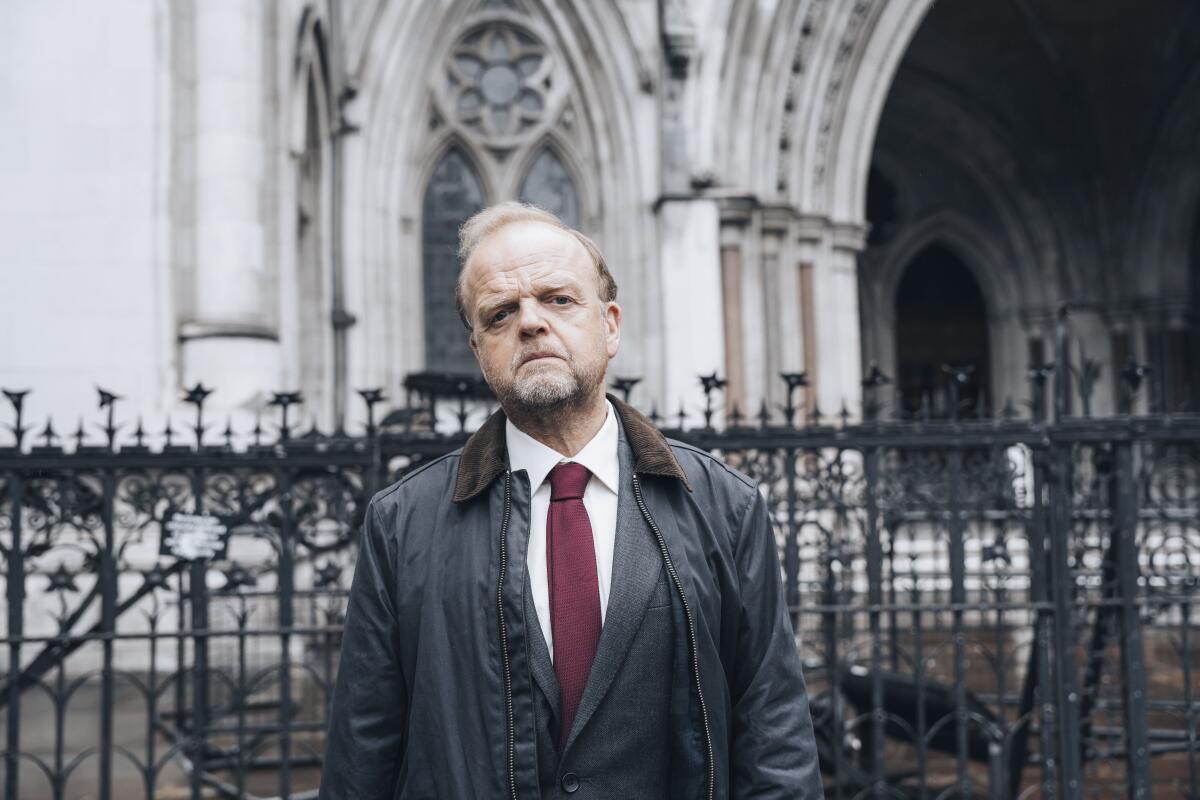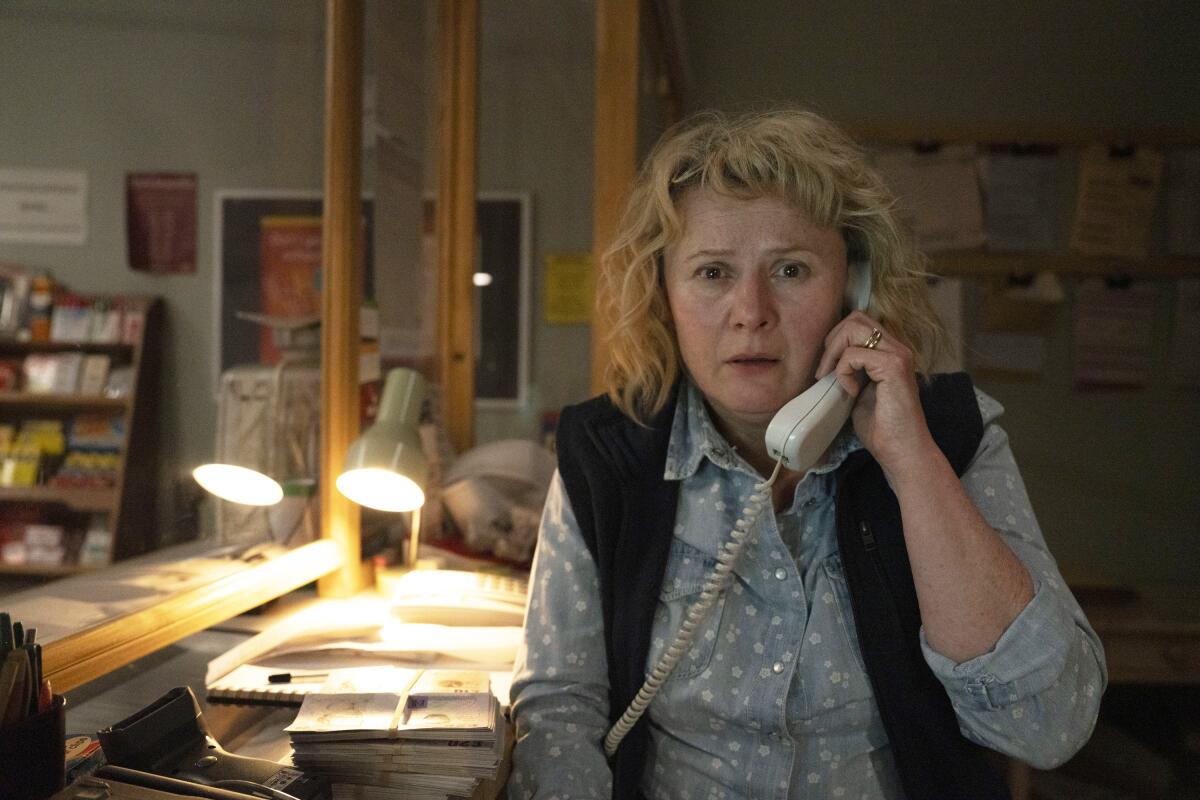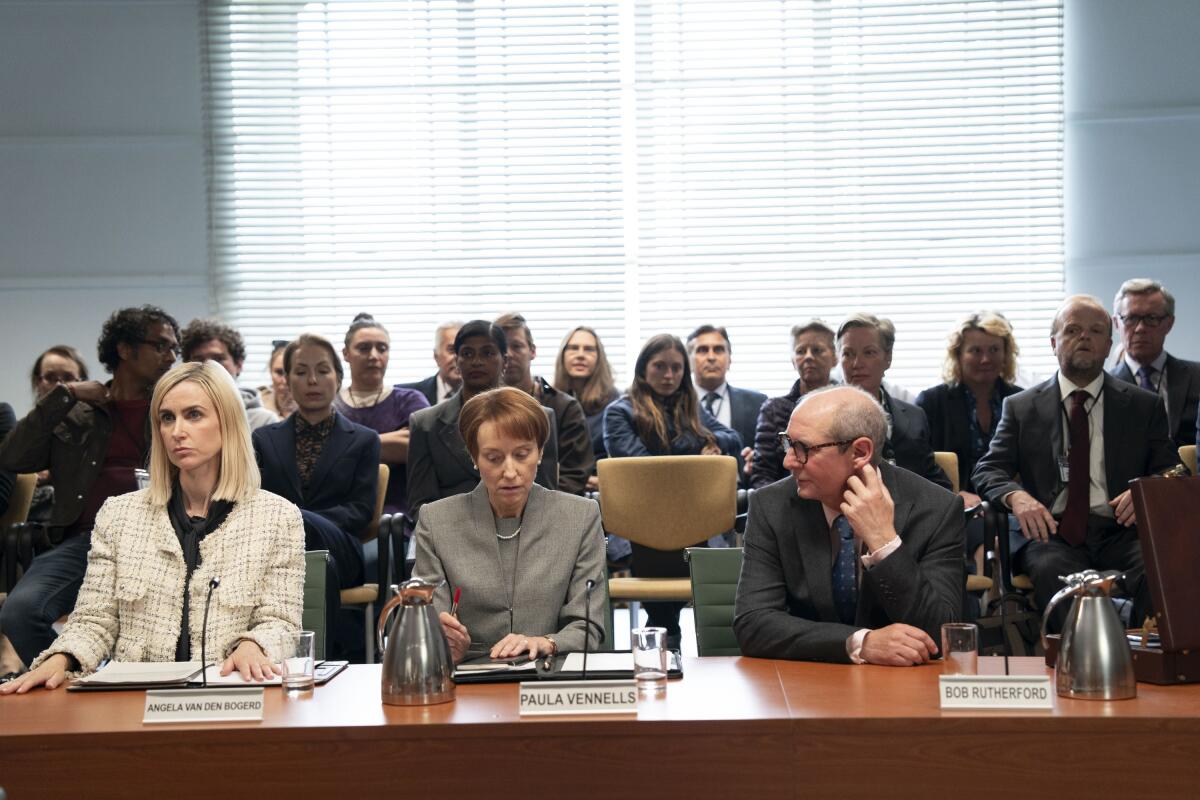In ‘Mr. Bates vs The Post Office,’ Toby Jones is the quiet, stubborn leader of a resistance

- Share via
This Sunday the PBS British-import series “Masterpiece” brings to American audiences the four-part “Mr. Bates vs The Post Office,” which caused a sensation when it was broadcast in January in the U.K. The title suggests something perhaps comical or fluffy — a man can’t get his mail delivered, or the postman keeps tramping through his flower bed (I know no postman would really do that) — as does the companionable presence of Toby Jones as Mr. Alan Bates, not to be confused with the actor.
The facts are darker. This is the true story of a 20-year Kafka-esque nightmare during which nearly a thousand “subpostmasters,” running franchised branches of Post Office Limited, were falsely accused, and often convicted, of theft, false accounting and fraud over accounting shortfalls that were in fact the fault of a bug-ridden computer accounting system — called Horizon and supplied by Fujitsu — that the Post Office insisted was perfectly fine. (“Robust” is the word we hear repeated.) Forced to “pay back” money that was never missing in the first place, people lost livelihoods, life savings, reputations and homes; there were bankruptcies and suicides.
The sweet-faced Jones — if you loved him in “Detectorists” you should love him here, in a part not a million miles away — stars as Alan, the quietly stubborn leader of the resistance, and the hub that connects the series’ several stories. His war with the authorities begins in 2003, in Llandudno, North Wales; as the first episode opens, he already has a “Justice for Post Office Victims” sign hung outside his shop, where his partner Suzanne Sercombe (Julie Hesmondhalgh) also sells yarn. To the thrumming of action-film music, black cars arrive carrying men in black trenchcoats — clothing, as a signifier of station, contributes to the story — to shut him down. He already suspects that “the fancy new computer system that they’ve spent an arm and a leg on” is at fault, and has refused to endorse its figures.

In South Warnborough, Hampshire, picturesque enough for an episode of “Midsomer Murders,” we meet subpostmistress Jo Hamilton (Monica Dolan, wonderful), carrying a tray of freshly baked buns past the pond to the Village Shop & Post Office, as neighbors greet her by name; sweetness itself, she helps a pensioner with her pension book, opens for business and finds herself in disagreement with the Horizon machine. (The unit, which is a sort of villain in the piece, is photographed ominously, like HAL 9000.) “I know it’s probably me,” a flummoxed Jo says to the unhelpful help line, “because I’m really rubbish with technology,” but it isn’t her.
And in Bridlington, East Yorkshire, subpostmaster Lee Castleton (Will Mellor) is calling the help line for the 91st time; he’s told (as everyone who calls with a problem is told) that no one else has reported any problems and that the accounts are secure from hacking. Meanwhile the Post Office wants “its” money. Wife Lisa (Amy Nuttall) asks what he plans to do. “Fight,” says Lee.
Soon these people, and more, will be gathered in a centrally located village hall and the Justice for Subpostmasters Alliance will be born. Meetings and mediations and courtroom scenes follow — “Mr. Bates” has aspects of a legal drama, and at times a conspiracy thriller — along with passages picturing representative aspects of the damage done. Things go up, things go down. A sympathetic member of parliament (Alex Jennings), an independent auditor (Ian Hart) and a lawyer (John Hollingworth) will pitch in to help. Though the series is ultimately inspiring, as stories of little guys taking on fat cats usually are — it’s a sentimental film tradition — the dominant tone is one of frustration. Awful things will happen before we are not done. And we are not done.
Even at four hours, the story is not a complete accounting of a long and complicated battle — which is not to say, notwithstanding some acknowledged name changes and invented scenes, it isn’t true to the facts, or that the important points aren’t covered. (The Wikipedia article “British Post Office scandal” runs to 16,000 words.) And it’s cast with actors who can create whole characters from dialogue that is 90% exposition, supplemented with smidgens of domestic detail, as when Alan assembles a picnic table or Lee’s daughter can’t find her sneakers.

Above all, “Mr. Bates vs The Post Office” is an indictment of bureaucratic arrogance and the familiar reluctance of institutions to admit, and when admitted, to rectify, mistakes. (Lia Williams as Post Office CEO Paula Vennells, and Katherine Kelly as “business improvement director” Angela van den Bogerd, embody the enemy.)
“Are they just incompetent, Alan,” asks Jo, “or just evil?”
“It comes to the same thing in the end,” says Alan.
It’s no spoiler to say that, in the end, this is not going to be a story of Goliath crushing David. That would hardly be worth the watching; at least, I wouldn’t recommend it. And yet, though much has been admitted and in some cases resolved, the wheels of restorative justice grind as slowly as the responsible parties want them to, or can get away with. Public outcry has led to the introduction of new legislation to speed things up, in vacating convictions and compensating the victims, but obfuscation and obstruction still seem to be the orders of the day. You can follow this ongoing drama in more or less real time on British television sites and YouTube channels.
And “Mr Bates vs the Post Office” has itself become part of the story. When it premiered on New Year’s Day in the U.K., it moved a story that had been reported over the years but never taken up as a public cause célèbre onto the front page. The prime minister spoke out. Additional victims came forward. If you want to get people angry about something, make it into television.
More to Read
The complete guide to home viewing
Get Screen Gab for everything about the TV shows and streaming movies everyone’s talking about.
You may occasionally receive promotional content from the Los Angeles Times.







